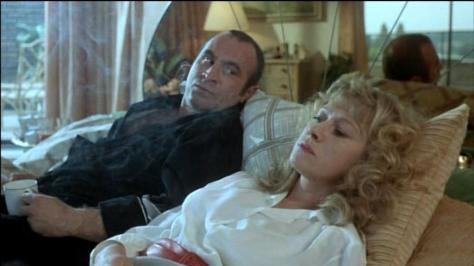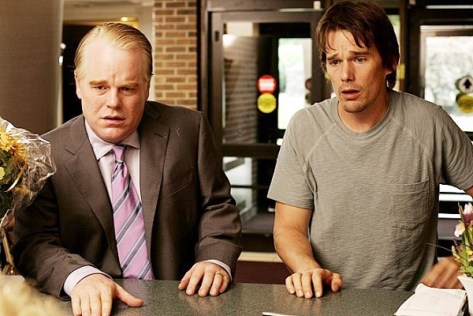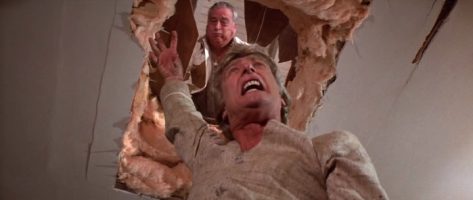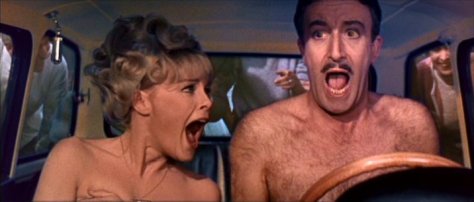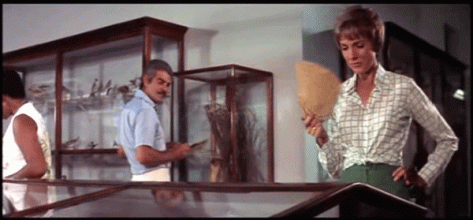By Dennis Hartley
(Originally posted on Digby’s Hullabaloo on April 9, 2011)

I was saddened to hear the news about Sidney Lumet, who died earlier today at the age of 86. We have truly lost one of the great filmmakers of our time. The term “actor’s director” gets thrown around a lot, but he was the actor’s director.
With a Lumet film, you may not necessarily expect a lot of stylized visual flash, but you may always expect a cast working at 110% of their potential. He knew how to tell a good story, without relying on bells and whistles-and that takes someone supremely confident in their craft.
In his 50+ year long career (he cut his teeth working in television drama during its “Golden Age”) he managed to collaborate with almost everybody who was anybody in the acting world; indeed many clamored to work with him. It is possible, however, that the most fruitful artistic partnership he had over the years was not with a person, but a city.
That would be New York, which served as the backdrop for so many of his classic films. Woody Allen, Abel Ferrara and Martin Scorsese aside, I can’t think of any other directors who have had such a symbiotic relationship with the Big Apple. At the end of the day, it’s about the work, so here are my picks for the Top 10 Lumet films:

The Anderson Tapes-In Lumet’s gritty 1971 heist caper, Sean Connery plays an ex-con, fresh out of the joint, who masterminds the robbery of an entire NYC apartment building. What he doesn’t know is that the job is under close surveillance by several interested parties, official and private. To my knowledge it’s one of the first films to explore the “libertarian’s nightmare” aspect of everyday surveillance technology (in this regard, it is a pre-cursor to Francis Ford Coppola’s paranoiac 1974 conspiracy thriller The Conversation).
Nice ensemble work from a fine cast that includes Dyan Cannon, Martin Balsam, Ralph Meeker, Alan King and Christopher Walken (his first major film role). The smart script was adapted from the Lawrence Sanders novel by Frank Pierson, and an exemplary Quincy Jones score puts a nice bow on the package.

Before the Devil Knows You’re Dead-It’s a testament to Lumet’s gift that his last film (which he made in 2007, at the age of 82) was just as vital and affecting as any of his best work over a long career.
Strongly recalling The King of Marvin Gardens, it’s a nightmarish neo-noir-cum Greek tragedy, starring Philip Seymour Hoffman as a stressed-out businessman with bad debts and very bad habits, which leads him to take desperate measures. He enlists his not-so-bright brother (Ethan Hawke) into helping him pull an extremely ill-advised heist that involves a business owned by their elderly parents (Rosemary Harris and Albert Finney). As frequently occurs in this genre, things go horribly wrong. Great work from the entire cast.

Dog Day Afternoon-Attica! Attica! As far as oppressively humid hostage dramas go, this 1975 true crime classic from Lumet easily out-sops the competition. The air conditioning may be off, but Al Pacino is definitely “on” in his absolutely brilliant portrayal of John Wojtowicz (“Sonny Wortzik” in the film), whose botched attempt to rob a Brooklyn bank turned into a dangerous hostage crisis and a twisted media circus (the desperate Wojtowicz was trying to finance his lover’s sex-change operation).
Even though he had already done the first two Godfather films, this was the performance that put Pacino on the map. John Cazale is both scary and heartbreaking in his role as Sonny’s dim-witted “muscle”. Keep an eye out for Chris Sarandon’s memorable cameo. Frank Pierson’s whip-smart screenplay was based on articles by P.F. Kluge and Thomas Moore.

Fail-Safe– Dr. Strangelove…without the laughs. There’s no fighting in this war room, but plenty of suspense. This no-nonsense thriller from 1964 takes a more clinical look at how a similar wild card scenario (in this case, a simple hardware malfunction) could trigger a nuclear showdown between the Americans and the Russians. The film’s haunting denouement is chilling and unforgettable.
Talky and a bit on the stagey side; but riveting nonetheless thanks to Lumet’s skillful pacing (and that trademark knack for bringing out the best in his actors), Walter Bernstein’s intelligent screenplay (with non-credited assistance from Peter George, who had also co-scripted Dr. Strangelove) and a superb cast that includes Henry Fonda, Walter Matthau, Fritz Weaver, and Larry Hagman.

Network– Back in 1976, this satire made us chuckle with its outrageous conceit-the story of a “fictional” TV network who hits the ratings g-spot with a nightly newscast turned variety hour, anchored by a self-proclaimed “angry prophet denouncing the hypocrisy of our time”.
Now, 35 years later, it plays like a documentary (denouncing the hypocrisy of our time). The prescience of the infinitely quotable Paddy Chayefsky screenplay goes deeper than prophesying the onslaught of news-as-entertainment (and “reality” television)-it’s a blueprint for our age.
In the opening scene, drunken buddies Peter Finch (as Howard Beale, respected news anchor soon to suffer a mental breakdown and morph into “the mad prophet of the airwaves”) and William Holden (as Max Shumacher, head of the news division for the “UBS” network) riff on an imaginary pitch for a news rating booster-“Real live suicides, murders, executions-we’ll call it The Death Hour.” A punch line in 1976; in 2011 we call it the “Nancy Grace Show”
The most famous scene is Beale’s “I’m mad as hell and I’m not going to take it anymore” tirade, a call to arms (borne from a “cleansing moment of clarity”) for viewers to turn off the tube, break the spell of their collective stupor, literally stick their heads out the window and make their voices heard. It’s a memorable and inspired set piece.
For me, the most defining scene is between Beale and Arthur Jensen (CEO of “CCA”-wonderfully played by Ned Beatty). Jensen is calling Beale on the carpet for publicly exposing a potential buyout of CCA by shadowy Arab investors. Cognizant that Beale is crazy as a loon, yet still a cash cow for the network, Jensen hands him a new set of stone tablets from which to preach-the “corporate cosmology of Arthur Jensen”. It is screenwriter Chayefsky’s finest monologue.
Faye Dunaway steals all of her scenes as Diana Christenson, the soulless, ratings obsessed head of development who schemes to turn Beale’s mental illness into revenue (“You’re television incarnate, Diana,” Holden’s character tells her.) With its “evergreen” relevancy, I think Network will stand as Lumet’s most enduring film.

The Pawnbroker– Rod Steiger delivers a searing performance as a Holocaust survivor, suffering from (what we now know as) PTSD. Hostile, paranoid and insular, Steiger’s character is a walking powder keg, needled daily not only by haunting memories of the concentration camp, but by the fear and dread permeating the crime-ridden NYC neighborhood where his pawnshop is located.
When he finally comes face-to-face with the darkest parts of his soul, and the inevitable breakdown ensues, it’s expressed in a literal “silent scream” that is the most astonishing moment in Steiger’s impressive canon. Morton S. Fine and David Friedkin adapted their screenplay from Edward Lewis Wallant’s novel. Lumet’s intense character study is a prime example of the “social realism” movement in American film that flourished for a period in the early 1960s.

Prince of the City-Lumet revisited the subject of New York City police corruption in this powerfully acted piece based on the true story of narcotics detective Robert Leuci (“Daniel Ciello” in the film), whose life got completely turned upside down after he agreed to cooperate with a special commission.
Treat Williams delivers his finest performance as the conflicted cop, who is initially promised he will never have to “rat” on any of his partners in the course of the investigation. But you know what they say about the road to Hell being paved with “good intentions”. Superb performances from all in the sizable cast (especially Jerry Orbach). Lumet co-adapted the screenplay from Richard Daley’s book with Jay Presson Allen.

Serpico-Sidney Lumet and Al Pacino go together like soup and sandwich, and this 1973 collaboration between director and star (their first) was the one that set the table. Pacino gets to chew a lot of scenery here as Frank Serpico, an altruistic NYC cop who helps expose the rampant corruption within the department (much to the chagrin of his fellow cops, who come to regard him as a pariah).
As per usual, Lumet wrings top-notch performances from his actors, and makes excellent use of NYC locales (captured in all their gritty glory by DP Arthur J. Ornitz, who did the cinematography for a number of “quintessentially New York” films, including A Thousand Clowns, The World of Henry Orient, The Boys in the Band, Next Stop Greenwich Village and An Unmarried Woman). Writers Waldo Salt and Norman Wexler adapted from the book by Peter Maas.

12 Angry Men-This is the film that put Lumet on the map as a feature film director. The narrative setup is simple. A Latino boy is on trial, accused of killing his father. His fate lies in the hands of a 12-man jury. Since we are not presented with many details about the trial itself, the film’s dramatic tension lies in the hands of the one juror who happens to hold a dissenting opinion (Henry Fonda). His subsequent attempt to bring the other eleven around to his way of thinking makes for an amazingly riveting drama (despite of how static it might read on paper).
The list of actors portraying the “angry men” reads like a Who’s Who of dramatic heavyweights-because it is (imagine Martin Balsam, Lee J. Cobb, E.G. Marshall, Jack Klugman, Jack Warden and Ed Begley all cooped up in a hot stuffy room, and all very cranky-can you just smell the ham burning?).

The Verdict– Lumet returned to the courtroom in this outstanding 1982 drama, armed with an incredible cast and a killer David Mamet screenplay.
Paul Newman gives one of his career-best performances as a burned-out alcoholic “ambulance chaser” who gets a shot at redemption when he takes a medical malpractice case to trial (after initially planning to take the path of least resistance by going for a quick and dirty settlement).
Jack Warden also shines as his best friend and fellow lawyer who helps him build his case (“That guy’s the Prince of fuckin’ Darkness,” Warden warns Newman, in a wonderfully droll Mamet line reading). James Mason is also at the top of his game as the opposing attorney. Charlotte Rampling is on hand as well, playing her duplicitous character with aplomb. Nice use of the autumnal Boston locales by DP Andrzej Bartkowiak.
Encore! 10 more: Q&A, Family Business, Running on Empty, Garbo Talks, Deathtrap, Equus, Murder on the Orient Express, The Offence, The Deadly Affair, The Hill.








